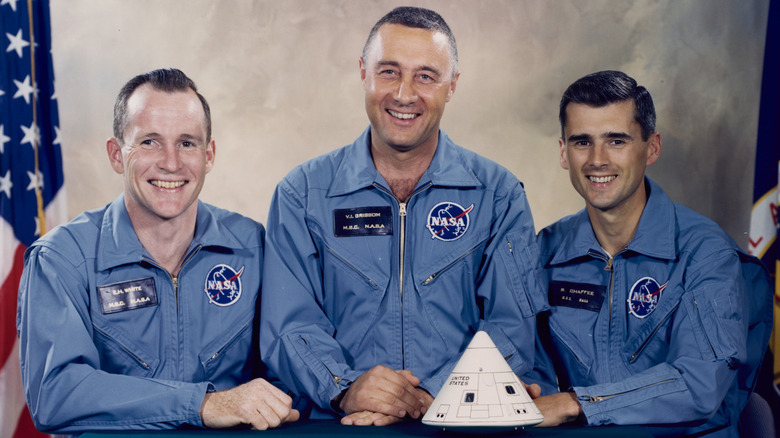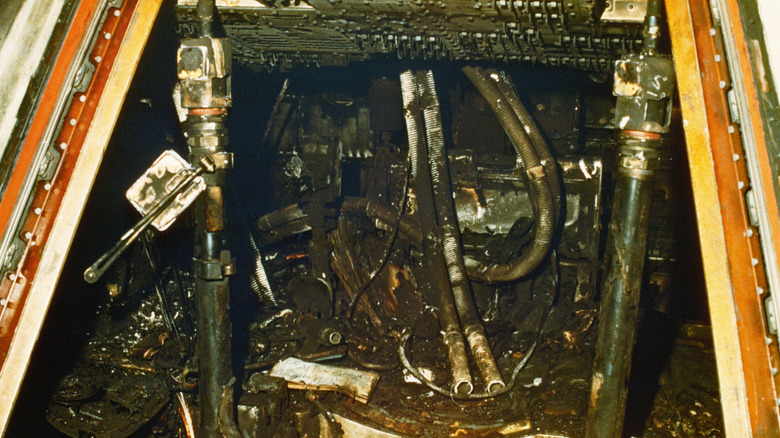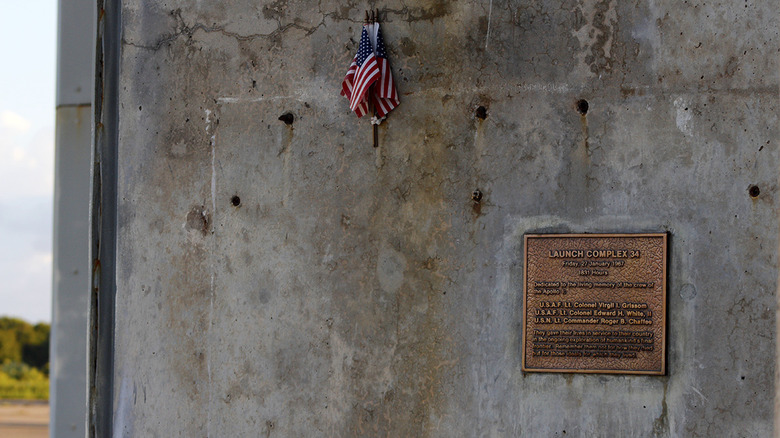The Chilling Final Words Of The Apollo 1 Crew
In comparison to the more recent Challenger and Columbia space shuttle disasters, fewer people likely know about the Apollo 1 catastrophe that killed the mission's three crew members. Back in 1967 — two years before humanity's historic 1969 moon landing – Virgil "Gus" Grissom, Edward H. White, and Roger B. Chaffee died while conducting training exercises in their space shuttle at Cape Canaveral Launch Complex 34. They accounted for three of seven total deaths leading up to the moon landing, and the site of their death has been converted into a permanent memorial.
Like the later deaths of the crews of the Challenger and Columbia spacecraft, Grissom, White, and Chaffee fell victim to "technical and management lapses," as a NASA investigation at the time concluded. And like their later counterparts, these three individuals died before anyone could save their lives. They also left us with some final words. In fact, the Apollo 1 crew was far more aware of their impending fate than others who lost their life in service to the stars.
At 6:31 p.m. on February 21 — ahead of the crew's intended launch — Grissom, White, and Chaffee sat in their craft on their launch pad going through a countdown simulation. They sealed their hatches and flooded the environment with oxygen — then a fire erupted in the module. The crew howled for help while others ran to rescue them. Before communications went out, Chaffee yelled, "Hey, we're burning up," per The New York Times.
Flames inside their module
Leading up to the horrific deaths of Virgil Grissom, Edward White, and Roger Chaffee there were zero indications that anything was wrong with their module. Their launch — officially named the Apollo 204 mission — was going to be the first manned Apollo mission in space. They'd gone through all of their training and sat in their module on the very launch platform that they were going to lift off from on February 21, 1967.
As the story goes, there was some worn wiring beneath Grissom's seat which had lost its insulation and laid exposed to the air as electricity ran through the live wire. Crews outside sealed the module's three hatches and filled the air inside with pure oxygen. A small movement made the wire spark, and because oxygen makes things burn very quickly in its pure form, it provided plenty of fuel for the fire to consume. The module cracked open and smoke started pouring out. The crew inside yelled for help and tried opening the hatches to escape but to no avail.
As NBC News recounts, brief cries came from the crew over headsets. White yelled, "Fire!" while Grissom said, "I've got a fire in the cockpit!" Chaffee echoed, "Fire!," and things get muddled from there. NBC News says that Chaffee yelled, "Get us out!," while Astronomy.com says he yelled, "Let's get out." Some accounts omit Chaffee's final line, but The New York Times says that he uttered, "Hey, we're burning up," before the crew lost contact with the outside.
A lasting memorial to the lost
Crew and doctors raced to the scene, hopeful to rescue the three-person crew. Ultimately, Virgil Grissom, Edward White, and Roger Chaffee didn't die from burns, but asphyxiation. The fire had eaten through the hyper-oxygenated air in the module environment leaving no oxygen for the astronauts to breathe.
The following year in 1968, another Apollo launch successfully lifted off from that very platform. In 1969, the year of the moon landing — the platform was decommissioned. By 1972, every part of the platform except the cubical, concrete support structure was removed. Now, that structure has a memorial plaque embedded on its surface that along with their names, reads, "Dedicated to the living memory of the crew of the Apollo 1 ... They gave their lives in service to their country in the ongoing exploration of humankind's final frontier. Remember them not for how they died but for those ideals for which they lived."
In 2017, the site hosted a memorial service attended by Grissom's still-living wife, who was 89 at the time. According to The New York Times, she said, "I don't want any of this forgotten. Gus Grissom was a human being."
Like other tragic losses of life, the Apollo 1 disaster might have wound up saving people later on. NASA established its Safety, Reliability, and Quality Assurance Office as a result of the catastrophe, and an independent safety board, the Aerospace Safety Advisory Panel (ASAP). It also made many other changes to procedures, equipment, and materials, right down to astronauts' spacesuits.
[Featured image by Zero-G News via Wikimedia Commons | Cropped and scaled | CC BY-SA 2.0 DEED]


